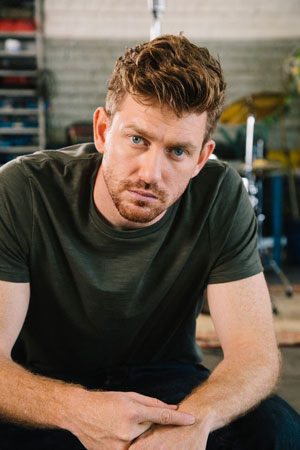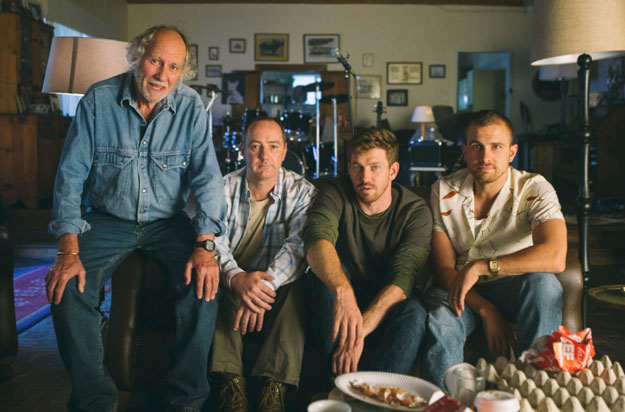Daniel Dercksen shares a few thoughts with award-winning actor Stiaan Smith, who stars in the new Afrikaans romantic comedy 'Sy Klink Soos Lente', and also wrote the screenplay.
Stiaan Smith is an award-winning actor and writer for both screen and stage. After studying at AFDA (Johannesburg), he acquired a BCom degree in finance from the University of Johannesburg. His play ‘Couchmate’ garnered various awards. He co-wrote the successful drama series ‘The Lab’. He also acted in the feature film ‘Sleeper’s Wake’, the short film ‘Vuil Wasgoed’, as well as the hit web series ‘Chin Up!’ His stage appearances include Brothers (Andre Stoltz) and Skuldeisers (Ilse van Hemert). He co-wrote and directed the Afrikaans mockumentary television series, ‘Hotel’, for kykNET.
What do you do when you meet the girl of your dreams and realise you’re not good enough for her?
You lie, of course… Ben (Stiaan Smith), a complacent mechanic meets Linda (Amalia Uys), a beautiful and outspoken auditor in a bar one night. They start chatting and there are immediate sparks, but when Linda asks Ben what he does for a living, he lies and tells her he’s the lead singer in a band, because not only is Linda out of Ben’s league, her father is also his boss. Linda immediately likes the charming muso, they fall for each other, and Ben has to start a band to conceal his lie and win over the girl of his dreams.
‘Sy Klink Soos Lente’ is an exciting approach to and revival of the Afrikaans Romantic Comedy genre.
Corné van Rooyen’s sensitive directing style and Stiaan Smith’s fresh script create a wonderful background for Amalia Uys and Smith’s gripping performances.
What inspired you to write ‘Sy Klink Soos Lente’?
I'm a fan of relationship-driven stories, whether it’s friendships or romantic endeavours, and I felt like the time was right to have a go at writing a screenplay. So, when the idea for the premise popped into my head, I went with it!
Tell me about the title.
The title of the film is named after the title of the song he (Ben) ends up writing for her (Linda) in the movie. And I like the idea that he was trying to invent a metaphor for what she sounds like to him. Like her voice, and her laugh.
It is a story about love and music?
Yes. Also about what it means to be good enough for someone else, and also about friendships. Ben has a few guys in the workshop who end up helping him out as band members, and there is also a very strong bromance element in the film.
Did the screenplay inspire the music, or how did the selection of music happen?
The Jannie du Toit song, ‘Liedjie vir jou’, was something I wanted to use from the beginning. And the title song was written with the name already in mind. But other than that, Bouwer Bosch and Dawie de Jager had free reign to let their genius loose.
Tell me about the process from page to screen. Was it a difficult process?
There's always going to be a bumpy transition period when you hand your script over to a director, especially if you’re sticking around to act in the film as well. But Corne van Rooyen made it easy to trust him and I was able to let go of any hang ups I had about what I thought the film should be. This also made it possible to only concern myself with the acting. We also had wonderful support in the production side (Film Factory and Bouwer Bosch Films) which brought a healthy combination of experience and passion to the project, making the transition as seamless as it could have been.
Did you write the screenplay with any specific actors in mind?
I'd rather not comment on this. But I will say that I've always wanted to work with James Cuningham (he plays Ryan in the film, the drummer), so that was a very fun experience when we were able to bring him on board. And it was wonderful to bring an English character into the world of a mainly Afrikaans story. Often the worlds we live in are never as clearly delineated as in stories, and in the South Africa, there's often a mix of languages, which was a nice dynamic to play with.
Director Corne Van Rooyen said that “’Feel-good movies are often shunned as ordinary or overrated, not being able to penetrate the truths of the human condition or to add to the intellectual and collaborative wellbeing of society. However, something magical happens when a story is told in an authentic, noncliché manner, with which the audience honestly and thoroughly relates.’’ What are your views on this?
I agree with anything Corne says and, once again, he has put it very well. I think the tendency is becoming more and more the need for realism in the stories we watch. I guess that's why mocumentaries are having a ball at the moment and reality shows are so appealing, so that's one thing we were going for. But even beyond that, regardless of how you decide to treat your story stylistically, authenticity is always a must. I feel that Corne has always had the ability to unlock that extra layer and make it so much easier for an audience member to buy in and get lost in the world of the story.
There’s a saying that writers must write what they know. How do you relate to the character of a mechanic masquerading as the lead singer in a band? Was this inspired by real-life events?
I think the "what you know" part is true, but goes deeper than the practical level of mechanic/music/auditor. For me, it's about relating with the fun aspect of friends getting together for a bigger cause and proving yourself worthy of the girl you love. Then the story events and situations become a vehicle to deal with those elements.
How do you see the local film industry?
Young, yet healthy and very much expanding. Everybody is so hungry to tell stories, and there is such a wonderful sentiment among all filmmakers at the moment. It's nice to be part of an industry where everybody wishes everyone success and room to develop their own voices.
What do you think it takes to be a screenwriter in South Africa?
You have to be honest with yourself with regards to whether your work meets up with the required standards. You have to be realistic and have the patience to keep developing your craft until somebody is willing to make your story, which is true for any territory, I guess. But it's harder in South Africa, because you can't just get a job at a studio as a script reader, for instance, which would help with learning the craft while you’re working. You have to do other work to keep you alive while making time to inch forward with your story, so you have to be determined and patient.
What do you think producers as looking for when they read new screenplays?
They don't even know. But when they pick up a new screenplay, all they hope for is that A, it appears reasonably cost effective to make (the reality of micro-budget filmmaking) and B, that they won't be able to put it down.
Do you see yourself as a writer or an actor?
It depends what time of day it is. I also recently had the opportunity to direct on a kykNET series, ‘Hotel’ (a mockumentary I co-created with Bennie Fourie), which is something I immediately took a liking to. So even though I am very passionate about being in front of the camera, I can see myself veering off in the future for stretches of time to write and direct.
You are a seasoned writer for TV and stage and now film. What is your favourite medium?
Stage is definitely the hardest for me. My imagination often lacks and then I find myself trapped in the limitations of realism. But my tendencies toward realism is also why film and television comes easier to me.
What’s next?
I'm currently working on a new screenplay. On the acting front, I'm very excited about playing the antagonist opposite Bennie Fourie in ‘Phil 101’, a new Nouvanaand Films comedy series, for kykNET.
‘Sy Klink Soos Lente’ releases nationwide on September 30.
www.facebook.com/SyKlinkSoosLente
Read more about the latest film releases: www.writingstudio.co.za




































